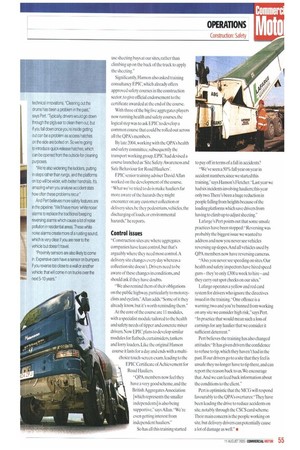Control issues
Page 55

If you've noticed an error in this article please click here to report it so we can fix it.
"Construction sites are where aggregates companies have least control,but that's arguably where they need most control. A delivery site changes every day whereas a collection site doesn't. Drivers need to be aware of these changes in conditions, and should ask if they have doubts.
"We also remind them of their obligations on the public highway, particularly to motorcyclists and cyclists." Allan adds. "Some of it they already know, but it's worth reminding them."
At the core of the course are 11 modules, with a specialist module tailored to the health and safety needs of tipper and concrete mixer drivers.Now EPIC plans to develop similar modules for flatbeds, curtainsiders, tankers and Ion-y loaders. Like the original Hanson course it lasts for a day and ends with a multichoice touch-screen exam, leading to the EPIC Certificate of Achievement for Road Hauliers.
-QPA members now feel they have a very good scheme, and the British Aggregates Association [which represents the smaller independents] is also being supportive," says Allan."We're even getting interest from independent hauliers," So has all this training started to pay off in terms of a fall in accidents?
"We've seen a 50% fall year on year in accident numbers, since we started this training," says Hanson's Fletcher."Last year we had six incidents involving hauliers; this year only two.There's been a huge reduction in people falling from heights because of the loading platforms which save drivers from having to climb up to adjust sheeting."
Lafarge's Pert points out that some unsafe practices have been stopped: "Reversing was probably the biggest issue we wanted to address and now you never see vehicles reversing up slopes.And all vehicles used by QPA members now have reversing cameras.
"Also,you never see speeding on sites. Our health and safety inspectors have hired speed gunsthey're only £300 a week to hire-and they carry out spot checks on our sites.
Lafarge operates a yellow and red card system for drivers who ignore the directives issued in the training."One offence is a warning; two and you're banned from working on any site we consider high risk," says Pert. "In practice that would mean such a loss of earnings for any haulier that we consider it sufficient deterrent."
Pert believes the training has also changed attitudes: "it has given drivers the confidence to refuse to tip, which they haven't had in the past. If our drivers go to a site that they feel is unsafe they no longer have to tip there, and can report the reason back to us.We encourage that.And we can feed back information about the conditions to the client."
Pert is optimistic that the Mai will respond favourably to the QPA's overtures:"They have been leading the drive to reduce accidents on site, notably through the CSCS card scheme. Their main concern is the people working on site, but delivery drivers can potentially cause a lot of damage as well." •


































































































































































































